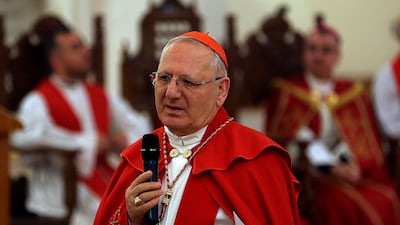The head of the Catholic Church in Iraq has called for intra-Muslim dialogue to promote religious harmony and avoid further conflict in the Arab region.
Cardinal Louis Raphael Sako, Patriarch of Babylon and head of the Chaldean Catholic Church, told The National on Tuesday that dialogue and reconciliation was necessary for regional stability and security.
“There are ongoing conflicts, in Syria, Lebanon and Iraq. There is a division between the Sunnis and Shiites, especially in Islam. Why can’t there be forgiveness between the people? Why can’t there be a direct dialogue and respect between the two sides?” Cardinal Sako said during a visit to the UAE.
The cardinal has just completed a trip to Bahrain, accompanying Pope Francis on his first visit to the Gulf state.
He was in the UAE for the Abu Dhabi Peace Forum, which aims to promote religious tolerance in the region.
“There should be a process of inclusion between the two sides — this is what God would want. Conflict between the two sides goes against what God wants,” he said.
During the Pope's visit to Bahrain, there were huge crowds of Christians from the region. During the trip the Pope spoke to a gathering of Catholic families that had made the Gulf island their home.
Cardinal Sako, 73, said this "showed the depth of how people are dedicated to their faith and the presence of God, which is a source of peace and love".
"This is what I felt and it touched my heart in Bahrain," he said.
Cardinal Sako said Dr Ahmed Al Tayeb, the Grand Imam of Al Azhar, a centre of Sunni learning, made a rare appeal at the Bahrain Dialogue Forum aimed at promoting religious unity between different faiths.
"I call on my brothers, Muslim scholars, across the world of every doctrine, sect and school of thought to hold an Islamic dialogue," Dr Al Tayeb said.
"Let us together chase away any talk of hate, provocation and excommunication and set aside ancient and modern conflict in all its forms," he said.
The differences between the region's Shiites and Sunnis have led to years of division between some countries. Some have held talks in an attempt to improve ties, especially Saudi Arabia and Iran.
In 2019, the pontiff signed a Muslim-Christian manifesto for peace in the UAE during the first papal visit to the Gulf region, where Islam was born.
'Worrying' time for Iraqi Christians
There are about 500,000 Christians left in Iraq following sectarian warfare after the 2003 US-led invasion and the seizure of a third of the country by the extremist group ISIS in 2014.
“The situation for Iraqi Christians is very worrying. Many have started to leave the country as they are unemployed due to sectarian differences,” Cardinal Sako said.
“Christians have no place in the workforce or even in government.”
Difficult economic conditions, a lack of job opportunities — especially for young graduates — harassment in the workplace and favouritism have all contributed to the decline in numbers of Christians in Iraq, the senior clergyman said.
It is not just Christians facing those issues, Cardinal Sako said.
“Muslims, those who used to live in dignity, are starting to look for countries that will give them their basic rights,” he said. “Why would people leave unless their country is not providing for them?”
He said officials in Baghdad have no vision for the future.
“The situation would make anyone cry; it’s heartbreaking. For 20 years we have not had any electricity, no water, no employment opportunities. How can a country like Iraq with rich resources get to this level?” he said.


